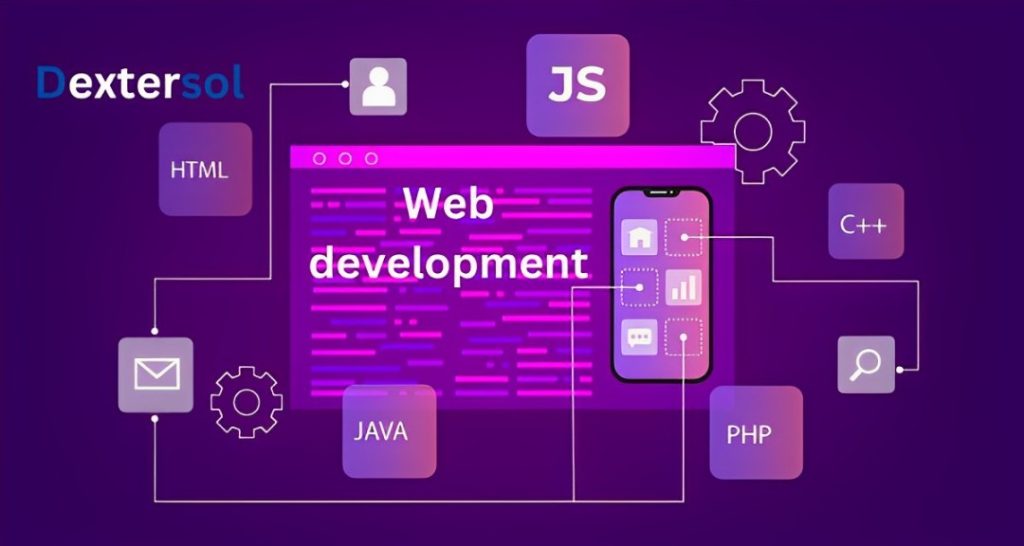Contents

How to get started in web development?
While getting started in web development may seem daunting, we can overcome it by breaking it into several stages. Below are some steps you can follow when you start developing your website.
Learn Basic Elements
To get started in web development, you should learn the basic elements of web development. You should learn CSS , JavaScript and HTML .
1. HTML
HTML stands for Hypertext Markup Language. HTML serves as a backbone for structuring web content. You should understand the structure and syntax of HTML. To get practice in HTML, you should build simple web pages. There are three elements in HTML: tags, elements and attributes.
✦ Tags
Tags are a method of categorizing the content of the website.
✦ Elements
Sections are parts of the web page. Tags of HTML represent that.
✦ Attributes
They modify the interaction of elements of a system.
HTML dictates how you build your site and arrange content for it. HTML can be learned in different ways. The web sources like the W3Schools, Coacademy, and Mozilla Developer Network.
2. CSS
CSS stands for cascading style sheets. CSS is used to enhance visual presentation. It will help you in styling your layout. CSS will help you style fonts, color themes, and layouts. To learn CSS, you should practice building web pages. You should understand the properties of CSS. It will help you in enhancing your visual presentation. You can learn CSS from various sources like W3Schools, Coacademy and Mozilla Developer Network.
3. JavaScript
JavaScript is a scripting language. It explains how to describe codes, data types and variables. JavaScript adds dynamic interactivity on the client side. Learn DOM (Document Object Model) modification and user interactions. You can learn JavaScript through Skill share and JavaScript tutorials by Microsoft and W3Schools.
Specify the area of specialization
You should choose which area of web development you have to specialize in. You can specialize in front-end, back-end and full-stack development.
1. Front-end development
Front-end development is in the user’s corner. It possesses the appearance and structure that users find on a website oration. You should know CSS, Python, HTML and JavaScript. Some frameworks for front-end development are the following:
✦ Gatsby
A freely available tool that assists you when creating Web applications. It looks very intellectual and well-groomed.
✦ Angular
A skill to undo withdrawals. Google maintains it.
✦ Bootstrap
Another helpful approach in the development of UI modules.
2. Back-end Development
A maker who develops or designs software is called a back-end developer. It would also be nice to know about algorithms and structures when a task involves creating a back-end developer. Some frameworks for back-end development are the following:
✦ Spring Boost
It embeds an MVC library that helps develop simple, user-friendly web apps.
✦ Cake PHP
It is the server-side backbone and provides complete security and reliability. It is the most popular framework.
✦ Django
It provides a wide range of tools, including ORM. It follows MVC architecture.
3. Full-Stack Development
It works on front-end and back-end frameworks. It is used in debugging and testing. It relates and optimizes the databases and maintains the website’s high functioning. In full-stack development, you should know how to control your skills.
Acknowledge tools
You should learn about text editors, program editors, web browsers, and design tools. You should start with the basics. To get familiar with it, you should take online courses, watch tutorials, attend workshops, and, more importantly, try out projects. To be more precise, as everyone knows, the proverb claims that practice makes a man perfect. You should manage your time. Furthermore, you can subscribe to online forums, communities and groups.
Understanding the tools and software is important because you will avoid making mistakes and get better results; it makes you more efficient; besides, you familiarize yourself with every latest trend and style.
Understand Programming Languages
To start web development, you should learn programming languages. It will help you build efficient websites, secure web data, develop problem-solving abilities and enhance the user’s experience and interface.
You should learn HTML, CSS, Gatsby, Angular, React, Vue.js and Svelte for front-end development.
You should learn about Hapi, CakePHP, Ruby on Rails, Laravel, Spring Boost, JavaScript and Python for back-end development.
For database development, you should learn how to create and edit files.
To learn programming languages, you should watch tutorials and online lectures, attend workshops, join groups and communities and practice as much as possible.
Study Progressive Concepts
You should learn advanced concepts like security features, scalability, code length reduction, community building, consistency, user-friendly format and enhancing user experience. Moreover, you should know how to target keywords, inspire your visitors to share content, upgrade your old content, monitor analytics, build trust and clarity and build backlinks.
You should learn programming languages, problem-solving techniques, authentication, web browser tools and how to build a portfolio.
Stay up-to-date
To start on web development, you should stay up-to-date with the web development industry, as well as bloggers and articles on web development. You should attend meetings, presentations and conferences. You should join online groups and communities and try to develop soft skills.
Conclusion
To start web development, you should have basic knowledge of how to develop a website. It is a flourishing career. You should know about web development languages. You should learn about designs and styling Mac, machine learning, and artificial intelligence. You should learn about new technologies, practice coding as much as possible, and engage with other developers. Stay up-to-date and learn about advanced concepts. Learn new technologies and get feedback from users. Web development is estimated to grow by about 16% in the coming years. So it’s a great career choice, and you should have a great experience.